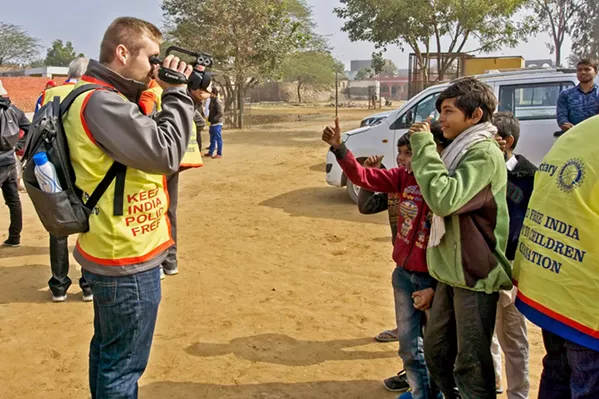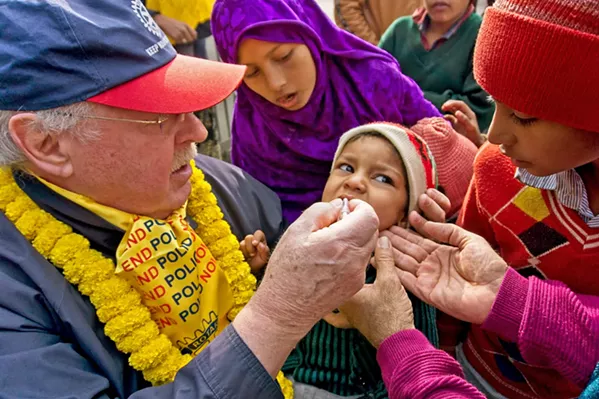Local filmmakers Eriksen and Soren Dickens release a documentary about Rotary International's worldwide polio vaccine program - New Times SLO
Local filmmakers Eriksen and Soren Dickens release a documentary about Rotary International's worldwide polio vaccine program - New Times SLO |
| Posted: 30 Jul 2020 04:02 AM PDT Most Americans don't remember polio epidemics, which could kill thousands and paralyze thousands more. That's because in 1955, Dr. Jonas Salk developed a safe and effective vaccine that virtually eradicated the disease in the U.S. Other countries haven't been so lucky, but in 1979, Rotary International began a global campaign to end polio, which is ongoing. Local 20-something filmmakers Eriksen and Soren Dickens, who run the media company Platinum Peek Productions, recently completed a short film chronicling Rotary's immunization efforts. click to enlarge 
"Two Magic Drops is a 14-minute documentary shot during a two week period in India, in January 2020," Eriksen explained via email. "The film is about Rotary International's involvement in providing polio vaccinations to children." It literally takes two oral drops to protect these children. "So far, India has technically eradicated polio, but because of India's close prolixity to Pakistan and Afghanistan (the two countries who have not yet eradicated the disease), India is still seeing cases," Eriksen continued. "The trip took place during the World Immunization Day, in which Rotarians from across the world come together and attempt to immunize over 100 million kids over a five-day period. This involves going to some of the most impoverished villages in India around the Delhi area, literally walking door to door to inoculate children." The film opens with gorgeous shots of India's impressive monuments, such as the Taj Mahal and Red Castle, as well as exotic wildlife like monkeys, but then it segues to India's slums, its impoverished children, and finally to Rotarian Brad Howard, who organized the trip Ericksen's brother, Soren, took to accompany their mother, a Modesto Rotarian. Though Soren hadn't planned to make a film, he borrowed a camcorder and started shooting. Later, back in the U.S., he handed the footage over to Eriksen, who cut it into the finished product currently available for free viewing on YouTube (youtu.be/BkuJR7TBxms). You may want to have a box of tissues handy. Between learning that the area's biggest industry is collecting cow patties for fuel and discovering that the caste system is alive and well in India, you'll be moved by the cheerfulness of these children, the charitableness of American Rotarians, and the knowledge that Rotary's good work is changing lives not metaphorically but literally. Not only is a new generation growing up free of the fear of polio, but Rotary and other organizations are helping Indians who suffer from the disease acquire prosthetic limbs and rehabilitation, or as Howard said, "helping those who didn't get the two drops ... live an upright life" instead of crawling on distorted and atrophied limbs. The Dickens brothers grew up in Oakdale but came to SLO to attend Cal Poly, where Eriksen, 25, graduated with a BA in Philosophy in 2017, and Soren, 23, is still working toward his BA in Business Marketing. They started their media company in Soren's dorm room in 2016. click to enlarge 
According to Eriksen, he "functions as the creative director, doing most of the story side of things—writing, directing, and editing. Soren functions as the director of operations, handling the business and technological side of things." The self-taught brothers grew up making homemade films and "specialize in documentary-style filmmaking, having produced both short and long documentaries for clients and just as passion projects." They say they "love telling stories about entrepreneurs and athletes," seeing as they're entrepreneurs themselves who grew up playing sports. The trip to India was truly something different and a real adventure for Soren. "I couldn't believe how many people there were," he said via email. "All the different sights and the smells. So many smells I had never experienced before." After his short tourist foray to the local sights, Soren and the Rotarians began the work they come for, inoculating every child under the age of 5. An Indian guide would lead them to vaccinate the children. "The poverty was eye-opening," Soren said. "The people had so little—nothing like what we consider poverty in the U.S. But surprisingly, all the children seemed so happy despite their dire circumstances." Informative, moving, and inspiring, Two Magic Drops is a reminder of the positive power of people when they come together to help. Even Eriksen, who wasn't able to attend the trip, immediately understood the impact of Soren's raw videotape. "The footage was so shocking," Eriksen said. "Even though I didn't go, I felt like I was right there in it." Over the next four months, Eriksen cut the raw material into a short documentary. Even though he had enough footage for a feature-length doc, he felt he "wanted to really show the gritty, fast-paced lifestyle of the Indians" and thought that if it was "a short documentary, people would actually watch it and be more apt to digest the whole thing." They released the film last month, calling the feedback "tremendous." The brothers also submitted it to international film festivals, and it's already been accepted by four. They're "waiting to hear from 20 more" and "are in the process of also getting the film placed on Amazon to be used as a fundraiser for the Polio Plus Foundation." "My trip to India changed my perspective on a lot of things" Soren said. "It made me realize how lucky we have it. I hope this film not only inspires people but restores a little faith in humanity." Added Eriksen, "I was honored to be able to put the film together and hope to be able to actually go to India one day in person. I hope this film instills a sense of unity in people when they watch it. I think it can start a lot of good conversations and remind people the world really isn't as small as we sometimes pretend it is." When Rotary began its global vaccination program more than 40 years ago, there were 350,000 new polio cases a year. Last year there were just 140. That's the power of people helping people. Δ Contact Senior Staff Writer Glen Starkey at gstarkey@newtimesslo.com. |
| Old Vaccines May Stop the Coronavirus, Study Hints. Scientists Are Skeptical. - The New York Times Posted: 29 Jul 2020 02:43 PM PDT  Billions of dollars are being invested in the development of vaccines against the coronavirus. Until one arrives, many scientists have turned to tried-and-true vaccines to see whether they may confer broad protection, and may reduce the risk of coronavirus infection, as well. Old standbys like the Bacille Calmette-Guerin tuberculosis vaccine and the polio vaccine appear to help train the immune system to respond to a broad variety of infections, including from bacteria, viruses and parasites, experts say. Now a study suggests that people who have received certain routine vaccines in the recent past — including childhood vaccinations like measles-mumps-rubella and polio, as well as adult flu vaccines — have lower coronavirus infection rates than those not recently vaccinated. But many experts greeted the conclusions with skepticism. The paper, an analysis of electronic health records from the Mayo Clinic, was posted online; it has not been through the peer review process and has not been accepted by a medical journal. Critics pointed to numerous methodological problems. It is a retrospective study; as such, it points to an association between vaccinations — a marker of overall good health and healthy behaviors — and lower infection risk. But the study does not prove a cause-and-effect relationship. While scientists generally consider studies like these useful for generating hypotheses that may be worth exploring further, they are far from definitive. The researchers analyzed the immunization records of 137,037 patients who had been tested for infection with the coronavirus, comparing matched pairs of vaccinated and unvaccinated patients who were otherwise similar. Updated Patients had lower infection rates if they had recently been given the high-dose flu vaccine or had been vaccinated against polio, measles-mumps-rubella, chickenpox, pneumococcal disease, hepatitis A and hepatitis B, or haemophilus influenzae Type B, compared with those who had not received those vaccines in recent years. The level of risk reduction varied, depending on the vaccine and on how recently the individual had been vaccinated. But generally, the childhood vaccinations were linked to a greater reduction in coronavirus infection than the high-dose flu vaccine given to elderly individuals. And some vaccines, if received five years before the study began, were tied to higher coronavirus infection rates, including the human papillomavirus vaccine and the one against typhoid, as well as the meningococcal vaccine. The researchers went to great pains to account for variables that might have made a difference, including testing rates and geographic variations in coronavirus rates, as well as demographic factors like age, race and ethnicity, though some critics said these efforts fell short. "The hypothesis we are testing is that the immune system memory is stimulated by the vaccine," said one of the authors of the paper, Venky Soundararajan, the founder of nference, a company that uses artificial intelligence to synthesize biomedical information. "Then along comes SARS-CoV-2," he said, "and the immune system is able to get the virus to back off and to clear it, so it can't invade multiple cells and become a full-blown infection." In one dramatic finding, Black patients who had received the pneumococcal disease vaccine five years before the study had a significantly lower risk of testing positive for the coronavirus, compared with similar patients who had not gotten the vaccine. That vaccine protects against 13 types of bacteria, including some that cause pneumonia. The Coronavirus Outbreak ›Frequently Asked QuestionsUpdated July 27, 2020
But experts said the findings should be interpreted with great caution. "Retrospective studies are great and they provide some hints, but there are caveats," said Dr. Shyam Kottilil, a professor of medicine with the Institute of Human Virology at the University of Maryland School of Medicine. "It's very difficult to establish causality." Interest in the cross-protective effects of vaccines has led to efforts to repurpose old vaccines that may have potential to provide at least transient protection against the coronavirus until a specific vaccine against SARS-CoV-2 is developed and proven safe and effective, he said. "But nobody knows whether this approach will work unless we test them," Dr. Kottilil said. "To endorse this, you need to do really good randomized clinical trials." There is little incentive for private companies to invest in expensive trials because the old vaccines are cheap and off-patent, he added. [Like the Science Times page on Facebook. | Sign up for the Science Times newsletter.] Dr. Christine Stabell Benn, a professor of global health at the University of Southern Denmark who has studied the potential nonspecific effects of vaccines against infectious diseases, said there is "ample evidence" that live attenuated vaccines can increase resistance to seemingly unrelated infections. But the new paper suffers from many limitations, she added, among them that the authors did not do enough to create comparable groups of vaccinated and unvaccinated individuals, and did not disentangle the effects of various vaccines. She was particularly concerned about the so-called healthy user effect: People who have the means and are anxious about their health are most likely both to get vaccinations and also to be tested for the coronavirus, even without symptoms. That "would lead to strong positive associations between vaccination and having a negative test result," Dr. Benn said in an email. "The authors acknowledge this and do something to mitigate the impact, but it remains a big concern." Carl Zimmer contributed reporting. |
| You are subscribed to email updates from "polio vaccine" - Google News. To stop receiving these emails, you may unsubscribe now. | Email delivery powered by Google |
| Google, 1600 Amphitheatre Parkway, Mountain View, CA 94043, United States | |

Comments
Post a Comment